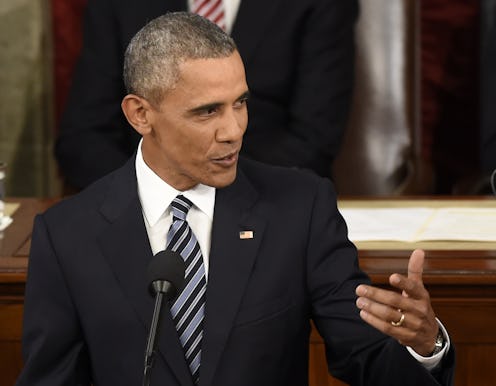News
Obama & Nikki Haley Differ On Protest Culture
President Obama didn't seem to miss a beat Tuesday night when he delivered his final State of the Union address, hitting many of the nation's most pressing issues and eliciting continued cheers from the audience. South Carolina Governor Nikki Haley seemed to finesse her way through the GOP's official rebuttal, as well, calling on her own experience in the Palmetto State to speak to many of the same issues as the president. One such issue was the talk of racially charged protests in cities where high-profile violence has occurred. Here, Obama's State of the Union and Haley's rebuttal differed in a particularly important way.
It's no surprise that the two speeches differed. In fact, it's newsworthy to an extent that they agreed on anything. (For the record, pretty much the only thing they seemed to echo was that they each dislike Donald Trump as a potential president.) Part of what makes their disagreement over activism in cities like Ferguson, Baltimore, and even Charleston is that this is an issue they've each dealt with on a serious level over the recent year or so. In other words, they're both expected to be leaders within their respective parties — and what they have said about it could be used to reflect what the party as a whole has to say about it.
In his address to the nation, President Obama celebrated the archetypal "protester" that many American cities have become acquainted with lately. Specifically, Obama said:
I see it in the American who served his time, and dreams of starting over — and the business owner who gives him that second chance. The protester determined to prove that justice matters, and the young cop walking the beat, treating everybody with respect, doing the brave, quiet work of keeping us safe.
In her rebuttal, Haley framed such protesting in more of a negative light:
We're feeling a crushing national debt, a health care plan that has made insurance less affordable and doctors less available, and chaotic unrest in many of our cities.
Obama has personally engaged with the issue of post-shooting protests on a national level, commenting publicly about the activism and violence in each city it has overcome. For her part, Haley has governed in times of such turmoil in her own state. Last summer, the city of Charleston was the site of a mass shooting at a historically black church. A huge protest over the Confederate flag followed, and local activism around the Black Lives Matter movement surged in Haley's territory. She mentioned this in her rebuttal also:
Our state was struck with shock, pain, and fear. But our people would not allow hate to win. We didn't have violence, we had vigils. We didn't have riots, we had hugs. We didn't turn against each other's race or religion. We turned toward God, and to the values that have long made our country the freest and greatest in the world.
Haley was widely praised for her work following the shooting, as she immediately worked with bipartisan support to remove the Confederate flag from government buildings in the state. In fact, her experience with this issue probably greatly influenced the GOP's decision to have Haley give the party's official response to the State of the Union. Clearly, she and Obama chose to speak about the issues differently in their respective addresses — and their word choices could affect what others in their respective parties say about this ongoing issue as the year and the presidential campaigns go on.
